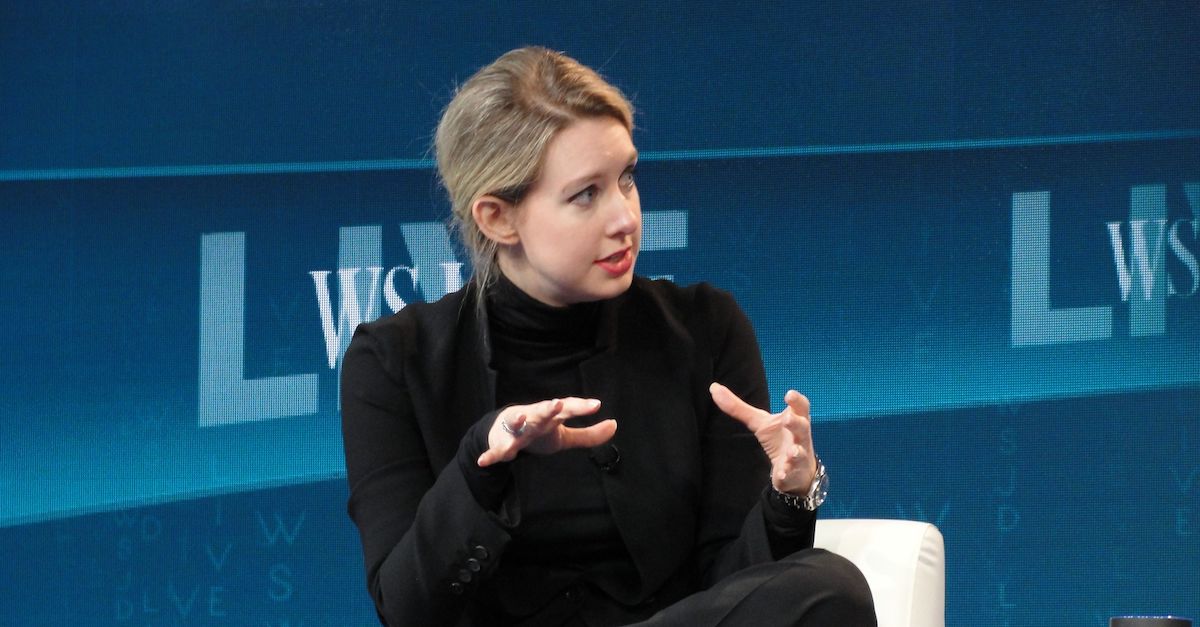
Theranos chief executive Elizabeth Holmes gestures as she speaks at a Wall Street Journal technology conference in Laguna Beach, California on Oct. 21, 2015.
Well before her case ever made in to a trial, the alleged fraud of Theranos founder Elizabeth Holmes became the subject of a critically acclaimed non-fiction book and a hit documentary. Her lawyers have wrangled with federal prosecutors on Tuesday about how to weed out the most voracious news consumers of her high-profile case from the jury pool.
During the hearing, U.S. District Judge Edward J. Davila questioned whether interrogating jurors about their news diets would be necessary, and he also charted the course for a lengthy 13-week trial later this summer.
In July 2018, a grand jury indicted Holmes and her former chief operating officer Ramesh “Sunny” Balwani on 11 counts alleging that they defrauded investors of millions with false claims that their start-up Theranos would revolutionize blood testing using a few drops of blood in a so-called “nanotainer.” Now slated to begin on Aug. 31, Holmes’s trial was delayed because of the announcement of her pregnancy. The judge reportedly arranged for her to have a quiet room to nurse her newborn at her upcoming trial.
U.S. District Judge Edward J. Davila convened a hearing to prepare for trial, which he anticipated will last roughly 13 weeks. He said that the questionnaire will inform candidates that it could last even longer.
Prosecutors and defense attorneys both plan to voir dire the jurors.
If the questionnaire takes the form the defense requested, juror candidates will have to provided detailed information about their favored sources of news and information.
“Where pretrial publicity is ample, voir dire should ‘inquire of the jury what information they [have] obtained relative to the case and their source of knowledge,'” Holmes’s lawyer Amy Mason Saharia wrote in a 12-page legal brief on June 7. “There is no question that this is such a case, with publicity that, unlike in almost all other corporate cases, has uniquely focused on Ms. Holmes personally. This requires investigation of jurors’ media exposure, the content of that exposure, and its effects on the prospective jurors.”
The questionnaire proposed by Holmes’s defense team in particularly detailed in asking about jurors’ media diets, even singling out more than a dozen journalists who have covered the case by name. (A Law&Crime reporter was named among this subset.)
Prosecutors have cast the defense inquiry as “excessive” and “invasive.”
Justifying this inquiry, Holmes’s defense team wrote: “This is necessary in light of the vast but highly varied coverage of this case, and the fact that adverse coverage has been ongoing for nearly six years. But there are important, refined differences across these sources. Outlets have different readerships; the volume of pretrial coverage is higher in some than others; different outlets have focused on different features of the case; and some outlets are more inflammatory in tone, while others are prejudicial because they purport to provide “insider” accounts of the events at issue, much of which is contested and/or will be inadmissible at trial.”
Since founding the company in 2003, Holmes became what Forbes called the youngest female self-made billionaire and her company once valued $9 billion before it all came crashing down with an exposé by Wall Street Journal’s John Carreyrou: “Bad Blood: Secrets and Lies in a Silicon Valley Startup.”
Federal prosecutors charged Holmes and Balwani on the year of that book’s publication, alleging a vast scheme to hide the deficient performance of the product from investors, doctors and patients. Holmes and Balwani lied about the company’s financial health, their partnership with Walgreens, the importance of Food and Drug Administration approval and more, prosecutors say.
(Photo by GLENN CHAPMAN/AFP via Getty Images)